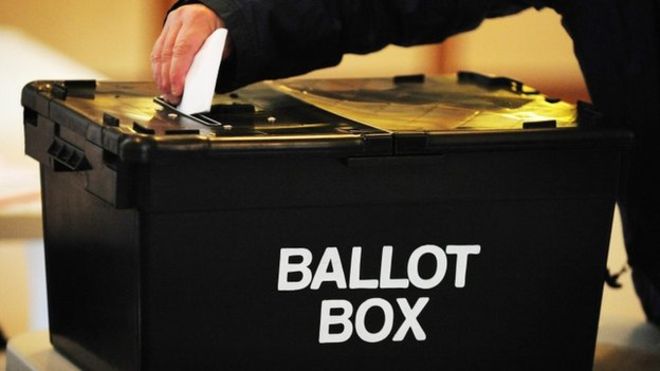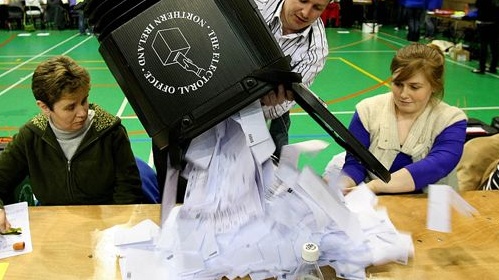
Following the announcement on Wednesday 22 May 2024, from the Prime Minister, the UK Parliamentary election will be held on Thursday 4 July 2024.
To have your say on who should become your local Member of Parliament in the General Election you must first register to vote.
Everyone who is on the official electoral register then has the choice of three voting methods: In person, by post, or by appointing a proxy to vote on their behalf.
– How do I register to vote?
Provided you are listed on the electoral register and at least 18 years of age on the day of the election, you can vote.
The Electoral Office have set up an online service (Am I Registered) to help electors quickly check if they are accurately Registered to Vote in Northern Ireland. The service will also supply your Electoral Office Digital Registration Number.
To use this service you must provide a mobile phone number that will be verified by text message. If you recently registered to vote, then you should allow up to 10 days for your electoral registration to be processed before checking this service.
The deadline for registering to vote at the UK Parliamentary Election on 4 July 2024 is midnight on 18 June 2024. If you are required to send in registration evidence documents they must be received by midnight on 26 June 2024.
– What does it mean to be registered to vote?
If you register to vote your name is put on the electoral register, which is a list of names and addresses of everyone who is eligible to vote.
There is both an “open” and a “full” version of the register. Anyone can view the open register, but you can opt out of having your name on this register.
A revised version of the full register is published on 1 December each year and updates are issued on the first working day of each month. If an election is scheduled a revised version may be published before the election.

The edited register omits the names and addresses of people who have asked to be excluded from that version of the register, either by ticking the Edited Register box on the registration form or opting out when registering online via www.gov.uk/register-to-vote.
– What are the different ways of voting?
You can vote by post, you can vote by proxy where someone else casts your ballot on your behalf, or you can vote in person.
– How does voting in person work?
To vote in person you must go to a polling place and fill out the ballot you are given and place it in a ballot box. Ahead of the election you will be sent a poll card which tells you where your polling station is. You cannot vote at a different polling place to the one you are assigned.
You do not need to bring your poll card with you, poll cards are for information purposes only – they are not required to vote.
If you’re not sure where your polling station is, you can find it on the Electoral Commission’s website here.
• East Derry/Londonderry Constituency Polling Stations
• Foyle Constituency Polling Stations
• Mid-Ulster Constituency Polling Stations
Inside the polling station staff will guide you on how to cast your vote. You will need to tell them your name and address – and you will be asked to produce your photographic identification (see list below) – so they can check you against the electoral register.
Your name, ward and electoral number will be read out. This allows any polling agents present to counter possible personation if, for example, someone was not who they said they were or were presenting with fraudulent identification.
You will be handed one or more ballot papers with a list of candidates or options. You should then go to the polling booth, mark your ballot paper next to your preferred candidate, fold it to conceal your vote and insert it into the ballot box.
If you make a mistake you can get a new ballot paper from the staff, but only if you have not put your ballot in the box yet.
If you need additional support in the polling station then please speak to one of the members of polling station staff. All polling station staff will be wearing badges to easily identify them.
– How does voting by post work?
If you are registered to vote, there are circumstances where you may not be able to get to your polling station to vote. Instead, you can apply for an absent vote. There are two types of absent votes:
Postal vote - this is where your ballot paper is posted to you in advance of the election. You then complete your ballot paper and post it back to us
Proxy vote - this is where you appoint someone you trust to vote on your behalf. They would go and vote for you in your allocated polling station
The deadline for applying to vote by post or proxy at the UK Parliamentary Election on 4 July is 5.00pm on 14 June 2024.
If you went online to register to vote, then you will have a Digital Registration Number and you MUST provide this Number on your postal/proxy vote application form. You can be sent your Digital Registration Number at this link www.eoni.org.uk/drn
– Temporary postal or proxy vote for the UK Parliamentary Election on 4 July 2024
If you are unable to attend the polling station on 4 July 2024 then you can apply for a temporary postal vote or proxy. You must have a reason such as 'I am away on holiday from (insert date) returning on (insert date)'.
Declaration A or B at Section 5 of the form must be completed. Don't forget, if your application is not attested (witnessed and supported by another person) it will be rejected.
– How does voting by proxy work?
You can apply to allow someone else to vote on your behalf, which is known as a proxy vote. Unlike with postal votes there are some criteria which you must meet to be allowed to apply for a proxy vote.
These include you being away on polling day, being registered as an overseas voter, having a medical issue or disability, or not being able to vote because of work or military service.
Your proxy voter must be someone who is both registered to vote and allowed to vote in that type of election.
– Can I vote in the UK if I live abroad?
To register to vote at a UK Parliament election, you need to download, print and complete a registration form.
On the application form, you can choose to vote by proxy or in person if you are likely to be in Northern Ireland on polling day.
When applying, you need to provide the last UK address you lived at or were registered to vote at. You also need to provide your National Insurance number and date of birth. These are used to verify your identity.
As part of your application, you need to submit details to prove you are a British or eligible Irish citizen. To do this, you will need to include your British or Irish passport details.
If you do not hold a British or Irish passport, you need to include either: Details of when you were granted citizenship; or Details of your place of birth if you are a British citizen born before 1 January 1983.
If you were too young to have registered to vote in Northern Ireland before you left the UK, you will also need to include your parent’s or guardian’s details and a copy of your birth certificate.
Send your completed application to the Electoral Office for Northern Ireland.
Your overseas vote will be valid for three years, lasting until 1 November in the third year after it takes effect (for example, if your declaration takes effect on 1 March 2024, it will expire on 1 November 2026). You will be contacted when it is time to renew your overseas vote.
– Do I need to bring ID to the polling station?
The law requires you produce one of nine forms of photographic identification when you vote at a polling station.
Full list of valid IDs:
The identification document does not need to be current, as long as the photograph is of a good enough likeness to allow polling station staff to confirm the identity of the holder.
The last option - the Electoral Identity Card - is solely for electors who have not got one of the other means (see list above) of photographic voter identification.

When you are in a polling station you will be asked to briefly remove any face coverings so that staff can check you resemble the photo on your ID. This includes face coverings worn for religious or medical reasons.
You can ask for this check to be made in private and by a female member of staff. If you feel uncomfortable showing your face, the Electoral Commission suggests you can appoint a proxy voter on your behalf or apply for a postal vote.
– How do I apply for an Electoral Identity Card?
The deadline for applying for an Electoral ID Card to use at the UK Parliamentary Election on 4 July 2024 is midnight on 26 June 2024.
You must be listed on the Electoral Register to get a card. To check if you are registered visit the Am I Registered page.
If you are not accurately registered to vote, then go to www.gov.uk/register-to-vote and as part of your online registration you can ask for an Electoral Identity Card application form to be sent to you.
If you are accurately registered to vote, then you can get an Electoral Identity Card application form by using the Electorial Office Contact Us page www.eoni.org.uk/contact-us
You should complete the Electoral Identity Card application form and, along with the other information required, post the documents to the Electoral Office.
– When is my polling station open?
Polling stations open at 7am on election day and close at 10pm.
However, the Electoral Commission says if at 10pm you are in the polling station, or in a queue outside the polling station, you can still apply for a ballot paper.
– When is the Election Count for UK Parliamentary Election?
The Election Count in the General Election will take place across three venues through the night starting at 10.00pm after close of poll on Thursday 4 July. The three Count Centres will be as listed below.
Titanic Exhibition Centre - Belfast East; Belfast West; Belfast North; Belfast South & Mid Down; North Down; Strangford
South Lake Leisure Centre - Lagan Valley; Newry & Armagh; South Down; Upper Bann
Meadowbank Sports Arena - East Antrim; East Derry; Fermanagh & South Tyrone; Foyle; Mid Ulster; North Antrim; South Antrim; West Tyrone
Subscribe or register today to discover more from DonegalLive.ie
Buy the e-paper of the Donegal Democrat, Donegal People's Press, Donegal Post and Inish Times here for instant access to Donegal's premier news titles.
Keep up with the latest news from Donegal with our daily newsletter featuring the most important stories of the day delivered to your inbox every evening at 5pm.